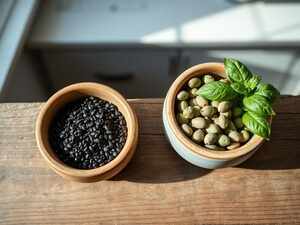Health
Chia vs. Basil Seeds: Dietitians Weigh the Nutritional Benefits

The growing interest in superfoods has brought chia seeds into the spotlight, now recognized for their numerous health benefits. However, less known but equally nutritious, basil seeds are gaining traction among health enthusiasts. According to registered dietitian Erin Palinski-Wade, both seeds offer a range of advantages, though they differ in nutritional composition.
Nutritional Overview
When comparing the nutritional profiles of these seeds, some significant differences emerge. A serving size of two tablespoons of chia seeds contains approximately 100 calories, 6 grams of protein, 10 grams of carbohydrates, 10 grams of fiber, and 8 grams of fat. In contrast, basil seeds pack about 130 calories, 5 grams of protein, 15 grams of carbohydrates, 15 grams of fiber, and 6 grams of fat.
Frances Largeman-Roth, another dietitian, emphasizes that basil seeds have a higher fiber content, offering 15 grams compared to chia’s 10 grams. Fiber plays a crucial role in digestion, blood sugar regulation, and satiety, helping to control portion sizes and potentially supporting weight loss. An average adult requires between 25-38 grams of fiber daily, a goal many Americans struggle to meet. Incorporating either chia or basil seeds can help bridge this gap.
Comparative Protein and Carbohydrate Content
When it comes to protein, chia seeds take the lead, providing 6 grams per serving compared to basil’s 5 grams. Notably, chia seeds contain all nine essential amino acids, while basil seeds lack two—lysine and methionine. This makes chia a more complete protein source, which is essential for overall health. Experts recommend aiming for 20-40 grams of protein per meal to support various bodily functions.
The carbohydrate content of both seeds is also significant, with chia seeds delivering 10 grams and basil seeds ranging from 7-15 grams depending on their source. Despite the carbohydrate content, both seeds derive their carbs largely from fiber rather than sugars, making them a healthy choice.
Other Nutritional Benefits
Both chia and basil seeds are rich in healthy fats, vitamins, and minerals. Chia seeds are particularly high in calcium, magnesium, phosphorus, omega-3 fatty acids, and antioxidants. On the other hand, basil seeds provide a substantial amount of iron and calcium, offering 370 mg per serving, which is higher than chia’s calcium content. Many Americans do not receive sufficient calcium in their diets, making basil seeds a valuable addition.
Making the Choice
Choosing between chia and basil seeds largely depends on individual dietary goals and preferences. Both seeds are gluten-free and provide fiber, protein, and healthy fats. Chia seeds tend to create a thick gel when soaked, helping to keep individuals feeling full longer, while basil seeds expand rapidly in liquid and may offer fewer calories.
For those seeking more calcium, basil seeds are a better option, while those looking for complete protein should opt for chia seeds. Both varieties are versatile and can enhance desserts, baked goods, and breakfast dishes by adding texture and nutrition.
Frequently Asked Questions
Q1: Which is healthier, chia seeds or basil seeds?
A: Both seeds are nutritious; chia seeds provide complete protein, while basil seeds offer higher fiber and calcium content.
Q2: How can I incorporate chia or basil seeds into my diet?
A: Soak them in liquid to create a gel, then add to smoothies, puddings, desserts, or breakfast bowls for added nutrition.
In conclusion, both chia and basil seeds are excellent choices for those looking to enhance their diets with nutrient-rich superfoods. Understanding their unique benefits can help individuals make informed decisions based on their health goals.
-

 World5 months ago
World5 months agoSBI Announces QIP Floor Price at ₹811.05 Per Share
-

 Lifestyle5 months ago
Lifestyle5 months agoCept Unveils ₹3.1 Crore Urban Mobility Plan for Sustainable Growth
-

 Science4 months ago
Science4 months agoNew Blood Group Discovered in South Indian Woman at Rotary Centre
-

 World5 months ago
World5 months agoTorrential Rains Cause Flash Flooding in New York and New Jersey
-

 Top Stories5 months ago
Top Stories5 months agoKonkani Cultural Organisation to Host Pearl Jubilee in Abu Dhabi
-

 Sports4 months ago
Sports4 months agoBroad Advocates for Bowling Change Ahead of Final Test Against India
-

 Science5 months ago
Science5 months agoNothing Headphone 1 Review: A Bold Contender in Audio Design
-

 Top Stories5 months ago
Top Stories5 months agoAir India Crash Investigation Highlights Boeing Fuel Switch Concerns
-

 Business5 months ago
Business5 months agoIndian Stock Market Rebounds: Sensex and Nifty Rise After Four-Day Decline
-

 Sports4 months ago
Sports4 months agoCristian Totti Retires at 19: Pressure of Fame Takes Toll
-

 Politics5 months ago
Politics5 months agoAbandoned Doberman Finds New Home After Journey to Prague
-

 Top Stories5 months ago
Top Stories5 months agoPatna Bank Manager Abhishek Varun Found Dead in Well









